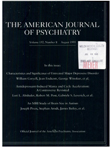Depressive comorbidity in children and adolescents: empirical, theoretical, and methodological issues
Abstract
OBJECTIVE: The purpose of the study was to examine comorbidity in the context of child and adolescent depression. METHOD: The authors reviewed recent epidemiological studies using standardized interviews and DSM-III or DSM-III-R criteria. RESULTS: There was a high rate of comorbidity in children and adolescents with major depressive disorders or dysthymia. Comorbidity with conduct disorder/oppositional defiant disorder ranged from 21% to 83%; comorbidity with anxiety disorder ranged from 30% to 75%; and comorbidity with attention deficit disorder ranged from 0% to 57.1%. Rates of depressive comorbidity found in community studies were similar to the rates found in clinical studies. In almost all cases, the disorders were more common in depressed children than expected by chance, and the rates of other disorders in depressed children were higher than the rates of depression in those with depression. CONCLUSIONS: The mechanisms by which comorbidity occurs are obscure at present. Several possibilities and their implications for nosology, epidemiology, and treatment research are discussed.
Access content
To read the fulltext, please use one of the options below to sign in or purchase access.- Personal login
- Institutional Login
- Sign in via OpenAthens
- Register for access
-
Please login/register if you wish to pair your device and check access availability.
Not a subscriber?
PsychiatryOnline subscription options offer access to the DSM-5 library, books, journals, CME, and patient resources. This all-in-one virtual library provides psychiatrists and mental health professionals with key resources for diagnosis, treatment, research, and professional development.
Need more help? PsychiatryOnline Customer Service may be reached by emailing [email protected] or by calling 800-368-5777 (in the U.S.) or 703-907-7322 (outside the U.S.).



